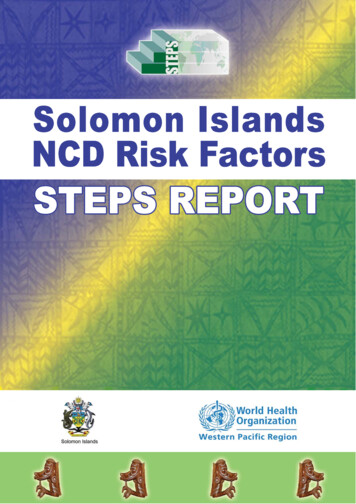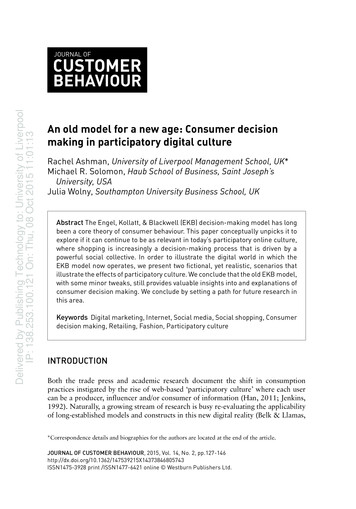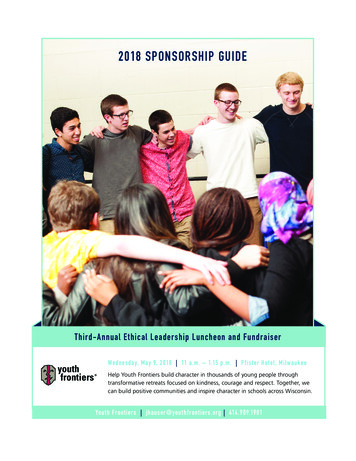
Transcription
Student HandbookSolomon S. Huebner SchoolDesignation Programs
The policies and procedures appearing in this Handbook have been approved under theauthority of The American College Board of Trustees and constitute official College policy.All students pursuing coursework through the Solomon S. Huebner School should familiarizethemselves with the contents of this Handbook. The policies presented herein outline bothstudent rights and responsibilities.The content of the Handbook may change as necessary to strengthen The College’s proceduresand processes. The College reserves the right to revise this Handbook at any time.All students pursuing designation studies at The American College are responsible for knowingand abiding by the terms of this Handbook.Questions related to the Handbook may be directed to the Professional Education Department,The American College of Financial Services, 270 S. Bryn Mawr Avenue, Bryn Mawr, PA 19010 orProfessionalEducation@theamericancollege.edu or by calling 888-263-7265.
Table of ContentsI. Huebner School Designation Programs . 1 Overview of HS Designation Programs Length of Programs Program Completion Experience Requirement Professional Recertification Requirement Course Registration Financial Obligations Transfer of Credit Obtaining Transcripts The College Code of EthicsII. Designation Program Descriptions . 6 CFP – Certified Financial Planner ChFC – Chartered Financial Consultant CLF – Chartered Leadership Fellow CLU – Chartered Life Underwriter ChSNC – Chartered Special Needs Consultant RICP – Retirement Income Certified Professional III. Instructional Delivery Formats . 14 Self-study Live Webinar Intensive Review Program (IRP) Residency (HS 385)IV. Learning Resources . 17 Blackboard Textbook Course Supplement E-Book Textbook E-Book Supplement Course Syllabus Study Plan Student Workbook Video Lectures and Presentations Audio Lectures Sample/Practice Exams Chapter Quizzes/Questionsi
Key Terms ExercisesOnline Review Sessions (RICP )Discussion Boards/ForumsWebinar Virtual ClassesStudent Help SiteLibrary ResourcesDiscussion Board Rules of ConductIllegal Downloading and/or Distribution of College MaterialsV. Student Support Services . 20 Overview of Student Services Contacting Faculty Exam CounselingVI. Library Services . 21VII. Grading and Examination Procedures . 22 How Grades Are Assigned Testing Procedures Grade AppealsVIII. Continuing Education (CE) Credits . 24IX. Refund Policies for Huebner School Designation Courses . 25X. General Contact Information . 25XI. College Policies . 25ii
Huebner School Designation ProgramsFounded in 1927 by industry pioneer Solomon S. Huebner, The American College has a longhistory in providing financial services education. The College graduated its first designees in theChartered Life Underwriter (CLU ) program in 1928. Since then, The College has awarded over200,000 professional designations to individuals working in financial services, serving as astandard bearer for quality education in the field.Professional designations in insurance, financial planning, retirement income planning, andagency leadership are offered through The College’s Solomon S. Huebner School. The College’saccreditation by the Middle States Commission on Higher Education extends to the HuebnerSchool programs, which are transferable as undergraduate coursework to other accreditedcolleges and universities.Length of ProgramsHuebner School designation programs range in length from 3 to 9 courses. The duration of eachcourse is approximately 4 months, but students complete coursework at their own pace. Moststudents progress through their declared program one course at a time, taking anywhere fromone to three years to complete the program. Others progress more rapidly, completing entireprograms in under a year. The College’s 5-Year Rule (see Policy on Satisfactory StudentProgress) requires students to complete their declared designation program within five years tomaintain the currency of their coursework.Program CompletionTo receive a Huebner School designation, students must successfully complete all courseworkand pass course examinations in their declared program, meet the experience requirement(described below) with no ethics violations, and agree to comply with The American CollegeCode of Ethics (see below). The Office of the Registrar determines and certifies that a studenthas completed all requirements. (Note that CFP certification is awarded by CFP Board, whichhas its own requirements. Visit rtification-requirements for more information.)Once certified, a student is considered to have graduated with all of the rights, privileges, andobligations pertaining thereto. Designations are delivered to students at their address of recordand new designees are invited to participate in The College’s periodic commencementexercises.Graduates of Huebner School designation programs are required to meet The College’sprofessional recertification requirement on an annual basis to maintain the currency of theirdesignation(s). The recertification requirement is described below.1
Experience RequirementThree years of full-time business experience related to the subject area of one’s declaredprogram is required for all Huebner School designations. For example, the following activitiesmeet the business experience requirements for ChFC certification:1. Insurance and healthcare Field underwriting and management, including sales and service activities, supervisionand management of persons involved in sales or services, or staff support of persons inthese activities Company management and operations in positions involving substantial responsibility2. Financial services and employee benefits Client service and related management, including direct contact with clients, supervisionand management of persons involved directly in the process of providing financialservices or employee benefits, or staff support of persons in these activities Financial institution management and operations in positions involving substantialresponsibility3. Other University or college teaching of subjects related to the Huebner School curriculum on afull-time basis at a regionally-accredited institution of higher education Government regulatory service in a responsible administrative, supervisory, oroperational capacity Activities directly or indirectly related to the protection, accumulation, conservation, ordistribution of the economic value of human life; these include the work of actuaries,attorneys, CPAs, investment advisers, real estate investment advisers, stockbrokers,trust officers, or persons in other similar occupationsThe three-year period of required experience must be within the five years preceding the dateof the award. An undergraduate or graduate degree from an accredited institution of highereducation qualifies as one year of business experience. Qualifying part-time businessexperience is credited toward the three-year requirement on an hourly basis, with 2,000 hoursrepresenting the equivalent of one year of full-time experience.Professional Recertification RequirementThe mission of The American College is to raise the level of professionalism in financial servicesby promoting ongoing education, ethical practices, and the pursuit of new knowledge for thebenefit of society.The College believes it is critical for its alumni to remain current regarding changes in thefinancial services profession. The demonstration of current knowledge, as well as ethicalconduct, are what distinguish those who have earned a professional credential from The2
American College from those who have not. The College therefore maintains a professionalrecertification/continuing education requirement as an essential component of its mission.From 2006 through 2016, The College maintained its recertification requirement through theProfessional Achievement in Continuing Education (PACE) program. The PACE Program is beingreplaced by the new Professional Recertification Program targeted to launch on January 1,2017.PACE participants are not required to take any action at this time, but should continue to tracktheir CE hours as they have in the past.Course RegistrationStudents may register online or by phone. To register online: go to www.theamericancollege.edu and look for “Enroll Now” To register by phone: call the Professional Education Department at 888-263-7265Monday – Friday, 8 a.m. to 6 p.m. ESTPayment is required at time of registration. Consult the College website for the costs associatedwith different course enrollments.Financial ObligationsStudents are responsible for the payment of all financial obligations upon enrollment. Coursematerials will not be shipped and access to online materials will not be made available until anybalance due is paid. No designation will be awarded to any student with a balance due.Required Student informationSpecific student information is required at the time of enrollment and at graduation. Mostimportantly, students are responsible to provide their social security number and currentcontact information.Transfer of CreditThe American College accepts credit for a limited number of comparable courses taken at otherregionally accredited colleges and universities. In general, up to three (3) courses may betransferred into the CFP , ChFC , and/or CLU programs. CFP certificants may transfer in upto six (6) courses if their CFP designation was awarded within the past 7 years.In reviewing an application for transfer of credit into one of our programs, The College willreview the title and course description of courses completed externally and compare those tothe College courses to which the student wishes to have the credits applied. Transfer of credit isnormally granted if The College believes there is a 75 percent or greater overlap in content.3
Students must be admitted to The American College before any transfer of credit can beposted.The College’s Transfer of Credit policy can be viewed in the Student Policies section on theCollege website. Contact the Professional Education Department at 888-263-7265 for additionalinformation.Obtaining TranscriptsBecause The American College is a regionally accredited college, many colleges and universitieswill accept credits earned here as applicable to their programs. It is the receiving institution’sprerogative to decide what credits they will or will not accept. We advise other institutions thatour Huebner School courses are worth three (3) credits at the upper tier (junior or senior)undergraduate level. This information is advisory in nature, and receiving institutions canaccept or reject it as they see fit.Students should contact the Professional Education Department (PED) at 888-263-7265 orProfessionalEducation@theamericancollege.edu to request an official transcript. If anotherinstitution requires course syllabi or other documentation of course content for transfer ofcredit purposes, PED can also assist students in obtaining those documents. Students may viewtheir unofficial transcript online through their student account. There is a fee for obtaining anofficial transcript.The American College Code of EthicsTo underscore the importance of ethics for our program completers, all Huebner Schooldesignees must adhere to The College’s Code of Ethics, which consists of the Professional Pledgeand The Canons. A designation may be removed for violations of these standards.The Professional Pledge“In all my professional relationships, I pledge myself to the following rule of ethical conduct:I shall, in light of all conditions surrounding those I serve, which I shall make everyconscientious effort to ascertain and understand, render that service which, in the samecircumstances, I would apply to myself.”The CanonsI. Conduct yourself at all times with honor and dignity.II. Avoid practices that would bring dishonor upon your profession or The American College.III. Publicize your achievements in ways that enhance the integrity of your profession.IV. Continue your studies throughout your working life so as to maintain a high level ofprofessional experience.V. Do your utmost to attain a distinguished record of professional service.4
VI. Support the established institutions and organizations concerned with the integrity ofyour profession.VII. Participate in building your profession by encouraging and providing appropriateassistance to qualified persons pursuing professional studies.VIII. Comply with all laws and regulations, particularly as they relate to professional andbusiness activities.The College’s certification officer is empowered by the Board of Trustees to ensure compliancewith all of the requirements necessary to obtain and continue using the College’s designationsand to enforce the Code of Ethics. The certification officer will investigate any complaints orreports of violations, which may originate with state commissioners of insurance, other publicand judicial bodies, individuals, and established institutions or organizations. In certaininstances, The College itself may initiate action based on apparent violations.Violations that may cause the certification officer to begin an investigation include convictionfor a misdemeanor or felony, and suspension or revocation of a license or of membership in anestablished institution or organization.The American College’s disciplinary process can result in a designee’s loss of the right to use adesignation. The process follows a detailed written policy, and if a designation is removed, theappropriate adjustment is made to the designation verification database onDesignationCheck.com.5
Designation Program DescriptionsFollowing are descriptions of the goal and purpose, intended audience, program learningobjectives, and curriculum of each of the Huebner School designation programs: Certified Financial Planner (CFP ) Education Program Chartered Financial Consultant (ChFC ) Designation Program Certified Life Underwriter (CLU ) Designation Program Certified Leadership Fellow (CLF ) Designation Program Chartered Special Needs Consultant (ChSNC ) Designation ProgramRetirement Income Certified Professional (RICP ) Designation Program6
Certified Financial Planner (CFP )MissionThe mission of the Certified Financial Planner (CFP ) education program is to prepare students to meetthe financial planning needs of consumers and to qualify for Certified Financial Planner certification bypassing the certification exam established by the CFP Board of Standards. This mission is achieved byproviding students with expert-led instruction in the general principles of financial planning, estate planning,investments, retirement planning, personal and commercial risk management (insurance), and income tax.Target Audience Financial service professionals striving to obtain the CFP designation. Financial serviceprofessionals include those currently working as or managing insurance agents, brokers, financialadvisors, bankers, commercial bankers and brokerage, and insurance company supportemployeesIndividuals who are not currently engaged in the financial service industry striving to earn the CFP designationStudents studying in the Chartered Life Underwriter (CLU ) or Chartered Financial ConsultantProgram (ChFC ) who are taking core financial planning courses and become interested inpursuing the CFP designation in tandem with other education from The American CollegeProgram Learning ObjectivesUpon completion of this program, the student should be able to:1) Function as an ethical, competent and articulate practitioner in the field of financial planning2) Demonstrate mastery of the core financial planning knowledge required of a Certified FinancialPlanner by passing the CFP certification exam3) Utilize the intellectual tools and framework needed to maintain relevant and current financialplanning knowledge and strategies throughout one’s career in financial services4) Apply financial planning theory and techniques through the development of case studies andsolutionsCFP CurriculumStudents must complete the following required courses.Course NumberHS 300HS 311HS 321HS 326HS 328HS 330HS 333Course TitleFinancial Planning: Process and EnvironmentFundamentals of Insurance PlanningIncome TaxationPlanning for Retirement NeedsInvestmentsFundamentals of Estate PlanningPersonal Financial Planning: Case Analysis7
Chartered Financial Consultant (ChFC )MissionThe mission of the Chartered Financial Consultant (ChFC ) designation program is to prepare students tomeet the advanced financial planning needs of individuals and professionals. This mission is achievedthrough expert instruction not only in the six required CFP courses in financial planning, but also inapplication courses covering advanced estate planning, nonqualified deferred compensation, andretirement planning. The ChFC program provides in-depth education enabling program completers toachieve a sustainable advantage in this specialized and competitive field.Target AudienceIn addition to the constituencies of the CFP program (i.e., individuals specifically seeking CFP certification), the intended audience consists of advisors or individuals seeking in-depth knowledge fromcontent areas including estate planning, retirement planning (including plan design and selection of adistribution option), and nonqualified deferred compensation.Program Learning ObjectivesUpon completion of this program, the student should be able to:1) Function as an ethical, competent and articulate practitioner in the field of financial planning2) Demonstrate mastery of the core financial planning knowledge required of a Certified FinancialPlanner by passing the CFP certification exam3) Utilize the intellectual tools and framework needed to maintain relevant and current financialplanning knowledge and strategies throughout one’s career in financial services4) Apply financial planning theory and techniques through the development of case studies andsolutions5) Apply in-depth knowledge in a holistic manner from a variety of disciplines; namely, estateplanning, retirement planning or nonqualified deferred compensation.ChFC CurriculumStudents must complete the required courses listed below.Course NumberHS 300HS 311HS 314HS 319HS 321HS 326HS 328HS 330HS 333Course TitleFinancial Planning: Process and EnvironmentFundamentals of Insurance PlanningApplications in Financial Planning IApplications in Financial Planning IIIncome TaxationPlanning for Retirement NeedsInvestmentsFundamentals of Estate PlanningPersonal Financial Planning: Case Analysis8
Chartered Leadership Fellow (CLF )MissionThe Chartered Leadership Fellow (CLF ) designation program is designed to develop students’ management andleadership skills. There is a strong emphasis on ethical application of the academic concepts to the real worldenvironment in order to increase professionalism across the industry. Students have the option to take thisdesignation in the Office Track or Field Track.Target AudienceOffice Track Home office supervisors or managers with three to five years of experience Agency office managers seeking in-depth managerial and leadership knowledge and skillsField Track Financial services professionals with three years of experience in a managerial role such as regional vicepresidents, regional/district managers, managing directors, managing partners, field managers, or salesmanagersCLF students are individuals who have been in management positions for at least two years and seek to developtheir management and leadership skills in an effort to better recruit, select, develop, motivate, and monitor highperforming individuals and teams.Program Learning ObjectivesUpon completion of this program, the student should be able to:1) Apply ethical standards and best practices in management and leadership2) Demonstrate an understanding of the process of recruiting, selecting, developing, motivating, andmonitoring high performing advisors and teams3) Apply a diverse set of management and leadership techniques that address the changing work environmentand the need for effective communication and interpersonal skills in team building efforts4) Utilize problem solving and decision processes to create a competitive advantage through locally effectivestrategic plan development that is in alignment with organizational goals and priorities5) Analyze and assess managers’ impact on and decisions regarding the critical support functions of marketingand human resource management.6) Integrate the CLF curricula into solutions for applied, real-world scenarios9
CLF CurriculumStudents must complete the courses specific to the program track they select in addition to these requiredcourses.Course NumberHS 382HS 383HS 384Course TitleLeadership in a Changing WorldInterpersonal Relationships in the WorkplaceCreative Problem-Solving and the Strategic Planning ProcessRequired courses for students in the Office TrackCourse NumberHS 387HS 388HS 389Course TitleMarketing Management of Financial ServicesHuman Resource ManagementCapstone: Leading in the Office EnvironmentRequired courses for students in the Field TrackCourse NumberHS 371orHS 381HS 372orHS 373HS 385*HS 386Course TitleEssentials of Management DevelopmentIntegrated Leadership Practices/Professional Patterns of ManagementField Leadership Series WorkshopsPractice Management Concepts for Agency ManagersCapstone: Leading the Marketing Organization of the FutureField Management Seminar* HS 385 is offered only in residency format. Students pursuing the CLF Field track will be required tocomplete this course in residence at The American College campus in Bryn Mawr, PA.10
Chartered Life Underwriter (CLU )MissionThe mission of the Chartered Life Underwriter (CLU ) designation program is to prepare students to meet theadvanced insurance and financial planning needs of individuals, families and business owners. Specifically, CLU designees offer client solutions in personal and business risk-management, business succession, estate planning,life insurance and annuities, and income replacement in retirement in accordance with the highest ethical standards.Target AudienceThe intended audience for the CLU program consists of life insurance specialists and other financial professionalswho wish to develop a strong understanding of the use of life insurance to solve financial issues. These practitionersare expected to serve the advanced financial planning needs of individual clients, business owners, andprofessionals in an ethical and professional manner.Program Learning ObjectivesUpon completion of this program, the student should be able to:1) Provide guidance to clients on types and amounts of life insurance needed2) Make recommendations on aspects of risk management, including personal and business uses of a variety ofinsurance solutions3) Provide guidance to clients on legal aspects of life insurance contracts and beneficiaries4) Assist clients in making decisions about estate planning, including proper holding of assets and title to assets, aswell as the implications of various wills and trust arrangements on financial, retirement and succession planningissues5) Provide a holistic and comprehensive approach to addressing the insurance planning needs of their clientsCLU CurriculumStudents must complete three elective courses from the list of eligible Huebner School courses in addition to therequired courses listed below.Course NumberHS 311HS 323HS 324HS 330HS 331Course TitleFundamentals of Insurance PlanningIndividual Life InsuranceLife Insurance LawFundamentals of Estate PlanningPlanning for Business Owners and ProfessionalsElective courses include: HS 300 (Financial Planning: Process and Environment), HS 313 (Individual HealthInsurance), HS 321 (Income Taxation), HS 325 (Group Health Benefits), HS 326 (Planning for Retirement Needs),HS 328 (Investments), HS 334 (Estate Planning Applications), HS 375 (Introduction to Disability), and HS 376 (Legaland Financial Issues for Special Needs Families).11
Chartered Special Needs Consultant (ChSNC )MissionThe mission of the Chartered Special Needs Consultant (ChSNC ) designation program is to provide state-of-theart education to prepare students to guide clients with respect to financial planning implications for a family memberwith a disability. The program addresses the emotional and educational needs of the disabled family member as wellas the important legal, ethical, and financial considerations faced by the family.Target AudienceChSNC students are individuals who have met the requirements for a generalist professional designation (i.e.,CLU , ChFC , or CFP ), or have an appropriate graduate degree (e.g., MSFS or equivalent) and seek to develop theskills to participate more effectively in a planning team assisting families with the special educational, legal, andfinancial considerations facing a disabled individual.Program Learning ObjectivesUpon completion of this program, the student should be able to:1) Determine the options for funding costs associated with the medical and housing needs of a disabled individual2) Demonstrate expertise with respect to qualifications for public resources for a disabled individual3) Apply ethical practices with respect to joint representation of the interested family members and the disabledindividual.4) Identify and understand key income tax and estate planning opportunities available to families with a specialneeds child.ChSNC CurriculumStudents must complete the following required courses.Course NumberHS 375HS 376HS 377Course TitleIntroduction to DisabilityLegal and Financial Issues for Special Needs FamiliesFinancial Planning for Special Needs FamiliesStudents who have completed the coursework listed above must hold a CLU , ChFC , or CFP designation, PFScredential, or master’s degree in financial planning (or equivalent areas of study) to be awarded the ChSNC designation.12
Retirement Income Certified Professional (RICP )MissionThe mission of the Retirement Income Certified Professional (RICP ) designation program is to providecomprehensive knowledge and skills that enable financial service professionals to ethically create and maintain aneffective retirement income plan for their clients. An effective retirement income plan is one that meets a client’sgoals and addresses the associated risks.Target AudienceThe RICP program is designed for advanced professionals with at least three years of financial service industryexperience and a general financial planning credential (e.g., ChFC , CLU , CFP ), or who specifically focus theirpractice on retirement income planning.Program Learning ObjectivesUpon completion of this program, the student should be able to:1) Create an effective and ethical retirement income plan to maintain a client’s desired lifestyle over the course ofretirement2) Prepare alternative solutions to mitigate retirement risks and address tax considerations3) Choose appropriate strategies for generating income from a client’s existing assets4) Assist clients in determining their optimal age for retirement and claiming Social Security5) Evaluate resources that can be used to support a financially secure retirementRICP CurriculumStudents must complete the following required courses.Course NumberHS 353HS 354HS 355Course TitleRetirement Income Process, Strategies and SolutionsSources of Retirement IncomeManaging the Retirement Income Plan13
Instructional Delivery FormatsCourses in the Huebner School (HS) designation programs are offered in the followinginstructional formats: Self-Study Live Webinar Intensive Review Program (IRP)Residency (HS 385)The Live Webinar and Intensive Review formats are considered enhancements to the self-studyformat and are available for most courses in the CFP , ChFC , and CLU curricula. Some coursesin the CLF and ChSNC programs are also available in the Live Webinar format. The scheduleof availability varies by course for the webinar and intensive review formats. The CLF Fieldcapstone course, HS 385, is available only as an on-campus Residency course.Below is information about each instructional format, the differences between the formats, andthe courses to which they apply.Self-StudyLearning Resources. The self-study format provides students with access to a range ofelectronic and hard copy instructional materials and resources, which they may use at theirown discretion and according to their preferred study patterns and schedules. Electronic Resources are available immediately upon course enrollment throughBlackboard, The College’s learning management system. Electronic resources availablein Blackboard are listed at the bottom of this section. Hard Copy Resources for most courses include a textbook, a study supplement, andaudio lectures reco
The American College of Financial Services, 270 S. Bryn Mawr Avenue, Bryn Mawr, PA 19010 or ProfessionalEducation@theamericancollege.edu or by calling 888-263-7265. i Table of Contents . CFP –










